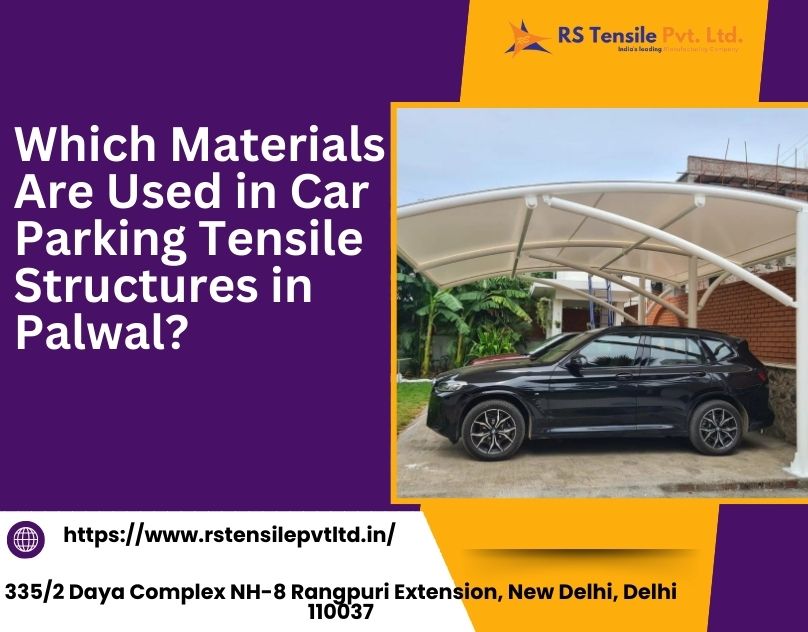
When it comes to modern architecture, tensile structures have revolutionized the way we design and build spaces, offering functionality, aesthetic appeal, and durability. a growing demand for tensile structure for car parking has led to innovations in materials and design. Let’s delve into the materials commonly used in car parking tensile structures, highlighting their benefits and why they are ideal for such applications.
1. High-Quality Fabrics
The fabric used in tensile structures plays a crucial role in ensuring durability, flexibility, and weather resistance. Some popular fabrics include:
a. PVC-Coated Polyester: This is one of the most commonly used fabrics in tensile structures. PVC-coated polyester offers:
-
Durability: It can withstand harsh weather conditions such as rain, strong winds, and UV rays.
-
Flexibility: The material is lightweight yet strong, making it ideal for covering large areas like car parking spaces.
-
Cost-Effectiveness: It provides an affordable solution without compromising quality.
b. PTFE-Coated Fiberglass: For premium applications, PTFE-coated fiberglass is preferred due to its exceptional properties:
-
Longevity: This fabric can last up to 25 years with minimal maintenance.
-
Resistance: It is non-flammable and highly resistant to extreme temperatures, ensuring safety and durability.
-
Aesthetic Appeal: The material’s glossy finish adds elegance to the car parking area.
c. HDPE (High-Density Polyethylene): This fabric is particularly suitable for regions like Palwal, where summers can be extremely hot:
-
UV Protection: It provides excellent UV resistance, protecting vehicles from harmful rays.
-
Ventilation: HDPE allows air circulation, reducing the heat trapped under the structure.
2. Steel Framework
The framework is the backbone of any tensile structure, providing strength and stability. Steel is the preferred choice for the following reasons:
a. Galvanized Steel:
-
Corrosion Resistance: Galvanized steel is coated with zinc to prevent rusting, ensuring longevity in humid or rainy conditions.
-
Strength: It offers excellent tensile strength, supporting the fabric and ensuring the structure remains sturdy.
-
Customizability: Galvanized steel can be easily molded into various shapes, allowing for unique and attractive designs.
b. Stainless Steel:
-
Premium Option: Stainless steel is highly durable and has a polished finish that adds a touch of sophistication.
-
Low Maintenance: Its resistance to corrosion and rust makes it ideal for long-term use.
3. Aluminum
While not as common as steel, aluminum is another material used in tensile structures, especially for smaller setups:
-
Lightweight: Aluminum’s lightweight nature makes it easy to transport and install.
-
Rust-Free: It does not corrode, making it suitable for areas with high humidity.
-
Sustainability: Aluminum is recyclable, aligning with eco-friendly construction practices.
4. Cable Systems
Tensile structures rely on cable systems to maintain tension and distribute loads evenly. The most commonly used materials for cables include:
a. Stainless Steel Cables:
-
Durability: These cables can withstand heavy loads and adverse weather conditions.
-
Flexibility: Stainless steel cables can be adjusted to create various shapes and designs.
b. Galvanized Cables:
-
Cost-Effective: Galvanized cables are a budget-friendly option without compromising strength.
-
Protection: A zinc coating prevents rust and corrosion.
5. Foundations and Anchors
The stability of a tensile structure heavily depends on its foundation and anchoring system. Materials used include:
a. Concrete:
-
Strength: Concrete foundations provide a solid base to hold the structure firmly.
-
Durability: It ensures the structure remains stable even during high winds or heavy rains.
b. Bolts and Anchors:
-
Galvanized Bolts: These are used to secure the framework to the foundation, preventing rust and corrosion.
-
High-Strength Anchors: They ensure the tensile structure remains firmly attached to the ground.
6. Protective Coatings and Paints
Protective coatings enhance the durability of both the fabric and the framework:
a. UV-Resistant Coatings:
-
These coatings prevent discoloration and degradation of the fabric due to prolonged sun exposure.
b. Anti-Corrosion Paints:
-
Steel and aluminum frameworks are often coated with anti-corrosion paints to prolong their lifespan.
Advantages of Using These Materials for Tensile Structures
-
Weather Resistance:
-
The combination of high-quality fabrics and durable frameworks ensures the structure withstands Palwal’s weather variations.
-
-
Aesthetic Appeal:
-
The materials allow for creative designs, enhancing the overall look of the parking area.
-
-
Cost-Effectiveness:
-
Tensile structures are more affordable compared to traditional concrete or metal shelters.
-
-
Eco-Friendliness:
-
Materials like aluminum and HDPE are recyclable, promoting sustainable construction.
-
-
Quick Installation:
-
Lightweight materials and modular designs make installation faster and hassle-free.
-
Conclusion
Car parking tensile structures in Palwal are gaining popularity for their practicality, durability, and aesthetic value. The use of high-quality fabrics like PVC-coated polyester and PTFE fiberglass, combined with robust frameworks of galvanized or stainless steel, ensures these structures meet both functional and visual requirements.
Whether you’re looking for a reliable shade for your vehicles or an elegant design to enhance your property, a tensile structure for car parking Palwal is an excellent investment.





Leave a Reply